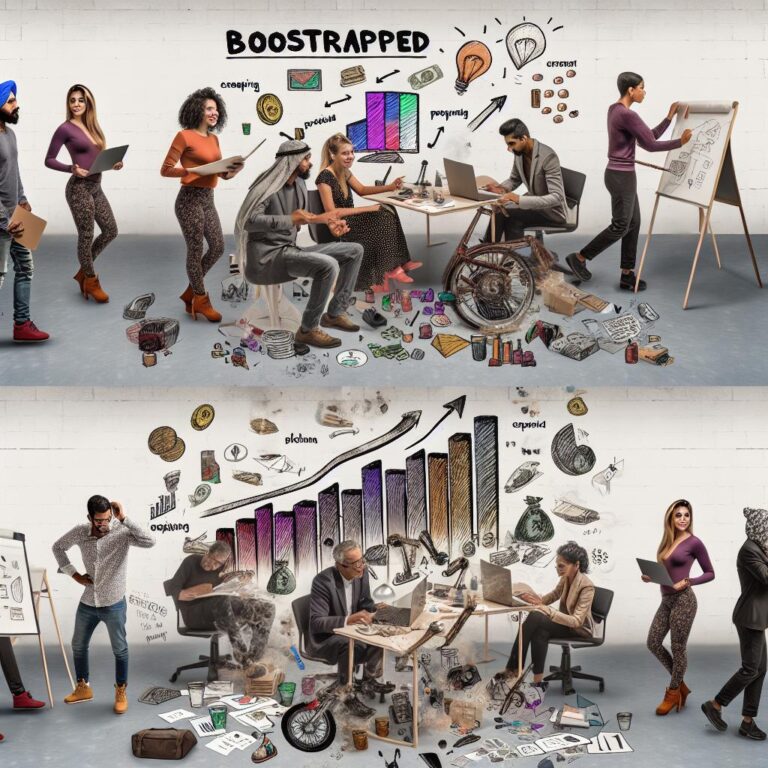Innovative tech startups: How are they shaking up sectors?
- Tech startups like Arcade AI disrupt traditional industries by integrating technology, offering customizable products, and utilizing AI for design.
- Arcade AI allows users to create jewelry designs, produced by artisans in materials like gold and silver.
- They use AI models such as Stable Diffusion and Midjourney, aiming to expand beyond jewelry to apparel and leather.
- Emerging technologies like AI, blockchain, VR/AR, and 3D printing are leading this disruption across various industries.
- Challenges in scaling startups include ensuring profitability, employing flexible pricing, and establishing partnerships with artisans.
- Venture capital fuels startup growth by providing funds, resources, mentorship, and industry connections; AI and green tech currently attract high investor interest.
- The global startup landscape prioritizes scalability, green tech, diversity, regional collaboration, and adapting to global markets.
Bold tech startups are shaking industries to their core. They challenge old ways with fresh ideas and nimble strategies. Imagine a world where tiny companies change giants’ game plans overnight. I'm diving into how these fearless innovators harness emerging tech, develop scalable business models, and leverage venture capital to fuel their explosive growth. Ready to explore the evolving startup revolution? Let's see which bright ideas lead us into tomorrow!
How Are Tech Startups Disrupting Traditional Industries?

Many tech startups are shaking up how we live and work. They bring new ideas that change old ways. With disruptive innovation, they create paths that surprise and delight.
Let's talk about some standout startups. Arcade AI, for example, inspires with jewelry design. You use your ideas or images to create designs. Once you choose a design, skilled artisans make it real using gold, silver, or gems.
Startups like Arcade AI challenge old business models. They use modern tech to offer personal touch products. People want products they imagine more than ready-made options. This approach makes them popular.
These startups ask: What if you could have exactly what you dream of? They show how tech can meet our wants. Their ideas help move from traditional shopping to custom experiences.
Arcade AI uses advanced design models. They include Stable Diffusion and Midjourney. These tools face challenges though. They need help making complex designs. For this, they plan to add tools that fix designs before finalizing.
Arcade AI will soon add more features. These features will make creating even more fun. They also want to team up with big brands. This idea means we'll see more tech options, beyond jewelry.
Their success does raise some concerns. Is AI pushing out human roles? However, Arcade's artisans see new opportunities. They work with tech to grow as designers and creators.
The story of Arcade AI showcases the power of tech in real life. With $17 million backing, they plan to go beyond jewelry. They are ready to reshape industries like apparel and leather, stepping into a future filled with possibilities.
What Technologies Are Leading the Disruption?

Emerging technologies shake up many industries. But, which are the most impactful? Artificial intelligence (AI) tops the list. AI allows machines to think like people, improving processes and products. For example, Arcade AI lets users design custom jewelry with ideas or images. Users, called "Dreamers," use a design generator to bring their ideas to life. Arcade's artisans then craft these pieces using materials like gold, silver, and gemstones.
Another key tech is blockchain. Blockchain transforms how we store and share data. It secures transactions and reduces fraud, especially in finance. It offers transparency and security, which many businesses need.
On to virtual reality (VR) and augmented reality (AR). These give us new ways to see and interact with our world. Think of AR in retail, where virtual try-ons help people choose clothes they love. Or consider VR in training, letting someone practice skills safely before going into the real world.
Lastly, don't forget about 3D printing. This tech changes how we make things, from houses to prosthetic limbs. It speeds production and saves costs. 3D printing also means customized products, fitting any need.
These emerging technologies disrupt by creating new paths and pushing old ways to evolve. They help industries stay ahead of trends and meet the demands of modern life. It's exciting to see how much tech can transform the world around us, with innovations always buzzing with potential.
For more on disruptive technologies, find insights here.
How Do Startups Develop Scalable Business Models?

Startups often face hurdles, especially when scaling. So, what strategies are crucial for scaling? Precision often begins with innovation. Startups like Arcade AI focus on creative tools that allow users to design unique products effortlessly. By engaging users to create and customize, startups ignite interest and build a solid customer base.
But scalability is about more than just growth. Startups must also ensure profitability as they expand. How do they achieve this? Many rely on flexible pricing strategies to cover costs while appealing to consumers. For example, Arcade AI offers a range of prices depending on the complexity of jewelry designs, starting from $100. Expenses like shipping are factored separately to maintain clarity in costs.
Moreover, partnerships are critical. By collaborating with artisans, Arcade AI delivers unique pieces, balancing creativity with craftsmanship. Startups also enhance their offerings to stay relevant. Here, the tools used to refine product designs ensure that the final output meets user expectations. By allowing adjustments, companies enable users to own the process and take pride in the outcomes.
However, scaling isn't without its challenges. Arcade's design platform uses avant-garde AI models to develop products. Still, there are times when these AI tools need human touch, particularly for complex designs. Startups, therefore, provide editing tools to bridge this gap, ensuring products meet quality standards.
In short, scalable innovation involves smart planning where technology meets consumer needs with precision. User engagement, flexible pricing, efficient partnerships, and continuous improvement form the foundation of scalable models for startups.
What Role Does Venture Capital Play in Startup Growth?

Venture capital is crucial for startups. But how does it fuel expansion? It provides money and support, allowing startups to scale and innovate faster. When a startup receives venture capital, it gains not just funds but also valuable resources like mentorship and industry connections. These resources can propel a startup from a mere idea to a market leader, opening doors to bigger opportunities and giving it an edge over competitors.
Now, what are the current investment trends in tech startups? Lately, there's a surge in venture capital going into AI and green tech. Startups that use AI to create custom products, such as Arcade AI, are especially attractive to investors. This trend reflects a shift towards more personalized and eco-friendly solutions. Investors are keen on supporting technologies that promise to transform industries responsibly.
Arcade AI, for instance, uses AI to design custom jewelry. This attracts backers who see the value in merging creativity and technology. The funding not only supports Arcade AI in enhancing its platform but also in refining its design process. Ventures like Arcade AI highlight how investors look for scalable ideas that can disrupt existing markets by using new tech approaches.
Backing from venture capital also signals to the market that a startup has potential. It can help start a cycle of growth where more investors and collaborators take interest. As a result, startups can achieve faster and more sustainable growth. Venture capital thus not only provides the initial spark but ensures the flame burns bright, driving startups towards long-term success.
How Is the Global Tech Startup Landscape Evolving?

The world of startups is buzzing with activity. But what are the key trends shaping the tech startup ecosystem? Let me dive in and tell you. Startups are now more global than ever before. Many founders dream beyond borders. They aim to solve problems not just locally but on a global scale. With technology, anyone can make their mark from anywhere on the planet. People now focus more on green tech and social impact. This trend shows that businesses can care for the planet and still thrive.
The focus on diversity is also growing. Companies understand that different views can spark great ideas. This shift is driving positive change. Another big change is in funding. Venture capital firms are putting money into new markets. They are looking beyond Silicon Valley. Places like Berlin, Bangalore, and São Paulo are becoming tech hubs, nurturing local talent.
How are regional differences influencing global collaboration in startups? Each region has its unique flair. This diversity can teach us all something new. For example, Asian companies often focus on speed and scale. Meanwhile, European startups might focus on quality and craft. These different methods can help improve businesses. They can lead to better collaborations and partnerships.
Take Arcade AI, a U.S.-based platform, as an example. It uses generative AI for jewelry design but looks globally to refine its product. By learning from others worldwide, Arcade sets the stage for collaboration. Such approaches push innovation forward. As the world connects, so do our ideas.
Conclusion
Tech startups are changing how industries work by breaking old patterns. They use new technologies and develop flexible business models. Startups grow with smart planning and support from venture capital. This backing helps them expand and innovate. The tech startup world is growing quickly, fueled by global trends and regional diversity. Staying informed about these changes helps us understand and adapt. Embracing this disruption opens doors to new opportunities and growth in today's fast-paced world.







